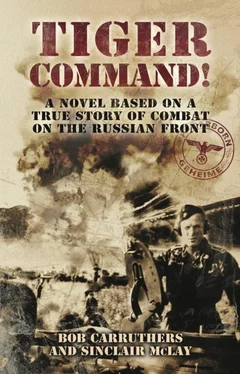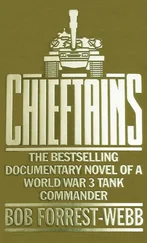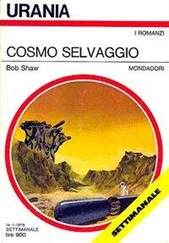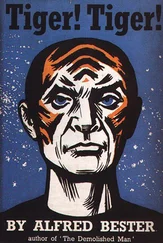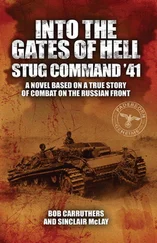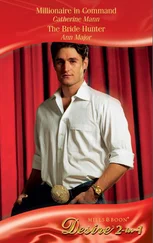A wide shot of the five crewmen receiving their awards from Hitler filled the screen.
“Hey, it’s us!” gasped an excited Otto Wohl.
“And here are the heroic crewmen who crewed the panzer in combat against the red menace. Led by Haupsturmführer Hans von Schroif, the crew consists of just five men◦– a commander, a gunner, a loader, a driver, and a radio operator who is also the hull machine-gunner.”
A big close-up of a smiling von Schroif filled the screen.
Otto Wohl gave a whoop of delight. “Hurrah, it’s the boss!” He was quickly shushed by the others, who were eager to hear the commentary.
“The tank commander is responsible for the vehicle and the crew. He is the brains of the outfit and has many duties. He indicates targets to the gunner, gives fire orders, and observes the fall of shots. He keeps a constant lookout for the enemy, observes the zone for which he is responsible, and watches for any orders from his commander’s vehicle. In action, he gives his orders to the driver and radio operator by intercommunication telephone, and to the gunner and loader by touch signals or through a speaking tube. He receives orders by radio or flag, and reports to his commander by radio, signal pistol, or flag.”
What concerned von Schroif was the fact that, behind himself and the crew, the mantlet and 88 mm gun of the Tiger could be clearly seen. This was obviously a deliberate inclusion on the part of the propaganda ministry. Rumours were rife, and a glimpse of the new machine was no doubt intended to give substance to the rumours, and to help bolster morale. Given the choice, von Schroif would have preferred no information to leak out, but then he was not the expert and, if he was honest about it, he was rather proud of his new life in the spotlight.
There was a cut to a close-up of a smiling Michael Knispel. In his embarrassment, Knispel couldn’t help let slip, “God, it’s me! My mother always said I’d be a movie star!” As Knispel looked on in amazement, the narrator kept up his rapid delivery.
“The gunner is second in command. He fires the turret gun, the turret machine gun, or the machine carbine, as ordered by the tank commander. He assists the tank commander in observation. In the action at Rostov, the actions were carried out by Michael Knispel, the Berliner born in 1910, who has achieved greatness in the boxing ring and has beaten Max Diekmann, who himself has beaten the great Max Schmelling!”
There was a spontaneous ripple of applause in the cinema and Knispel slouched down in his seat to avoid recognition. As the camera cut to a close up of Wohl, gurning into the camera, the young man fell uncharacteristically silent as he drank in every moment of his short burst of fame.
“Otto Wohl, the laughing loader, is a young man from Munich who typifies all that is best from that proud area of the Reich. The loader loads and maintains the turret armament under the orders of the gunner. He is also responsible for the care of ammunition and, when the cupola is closed, gives any flag signals required. He deputises for the radio operator in an emergency.”
“If Knispel farts and he has to bail out, you mean!” quipped an excited Otto Wohl, who was quickly silenced by a look from von Schroif.
Bobby Junge’s beaming face now filled the screen.
“The driver is SS-Panzerschütze Bobby Junge from Heidelberg. Junge is renowned for his pre-war performances against Rudolf Caracciola and the tragic Bernd Rosemeyer at the Nurburgring, which indicated a trajectory of great success. Once the war is won, we hope that racing will once again be a part of the young man’s life. He operates the vehicle under the orders of the tank commander, or in accordance with orders received by radio from the commander’s vehicle. He also assists in observation, reporting over the intercommunication telephone the presence of the enemy, or of any obstacles in the path of the tank. He watches the fuel consumption and is responsible to the tank commander for the care and maintenance of the vehicle.”
Last but not least came a close-up of an embarrassed Karl Wendorff. Unlike the others, Wendorff didn’t smile or mug for the camera. He squirmed in his seat as the narrator turned his attention to the radio operator’s role.
“Finally we have the Funkmeister, SS-Panzeroberschütze Karl Wendorff, the quiet philosopher, who turns his abilities to the practical duties of a panzermann. The Funker operates the radio set under the orders of the tank commander. In action, when not actually transmitting, he always keeps the radio set at ‘receive.’ He operates the intercommunication telephone and writes down any radio messages not sent or received by the tank commander. He fires the machine gun mounted in the front of the tank. He takes over the duties of the loader if the latter is wounded. These then are the lions of Rostov, five very different men, and now these great talents and personalities are combined, working together as one, for the glory of the Reich!”
The newsreel moved on to the subject of folk dancing in the Danzig region and von Schroif nodded to his crew. As a man they left the cinema and, as they moved through the afternoon crowds, the Tiger men knew the reason for the smiles and pointing fingers. For this week at least, they were movie stars. This unsettling fact was confirmed when a small group of workers stopped to applaud.
The only slight cloud on the horizon was the prospect of an evening spent listening to Wagner’s Rheingold. Wendorff, of course, could barely contain his enthusiasm, but the others were less than thrilled at the prospect.
Sensing the mood, von Schroif knew it was time to ply his team with some pre-theatre anaesthetic. Settling down at a garden table in the Brauhaus, von Schroif noted that he and his crew were the centre of attention. At the next table, a four-man Sturmgeschütz team in their grey uniforms gave their undivided attention to the Tiger men.
“Hail the Rostov heroes!” They raised their glasses.
They permitted themselves a beer, which the host kindly donated. This gift was soon followed by flowers from two groups of girls who passed, giggling and smiling. This was almost peacetime, von Schroif reiterated to himself. This was contentment, this was to be treasured…
Suddenly they were interrupted by a very pretty girl whose face suggested that she was less than appreciative of the efforts of the Tiger men. She marched straight up to Wohl, arms folded, and with an obvious sense of purpose.
“So, here you are again!”
“Magda! What a surprise,” spluttered Wohl.
“Not as much of a surprise as when I found out you were romancing half of Paderborn! You two-timing little runt.”
“Look, that’s not true.”
“Yes, it is, and you know it.”
Magdalena Klinsman had clearly been waiting for her moment and she was not about to let it go. “I should have listened to my father. Damn Bavarians!”
“Look, Magda, don’t be too harsh.”
“Harsh? You don’t know the meaning of the word. Harsh is sending the same letter to two girls who work in the same factory. You’re an untrustworthy pig. Never trust a Catholic, Dad says, and he couldn’t be more right.”
“Too true, young lady!” interjected Michael Knispel, clearly relishing the fun. “I don’t trust them either… especially this one.”
“No one asked you to speak, Mr. Ugly!” With that, she nimbly grabbed the beer mug from in front of Knispel and emptied it over the unsuspecting head of Otto Wohl before storming off into the early evening light.
A ragged cheer rose from the Sturmgeschütz crew.
Von Schroif did not like the look in the eye of Michael Knispel, who had lost half a litre of precious Weiss bier. “Right boys,” said von Schroif, “time to go home and get Wohl cleaned up.” Out of the corner of his eye he noticed Karl Wendorff’s face drop. Von Schroif knew exactly why, but he was only fooling. “But first… let’s sample a little Wagner!”
Читать дальше
